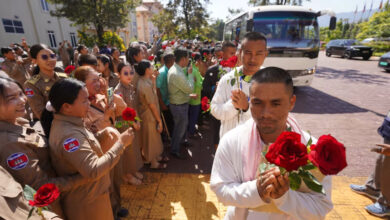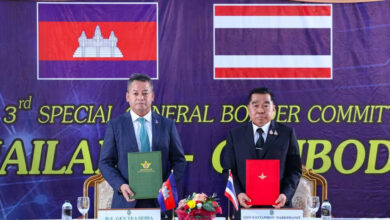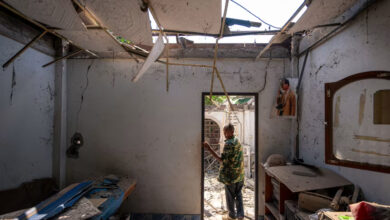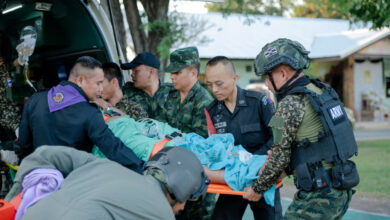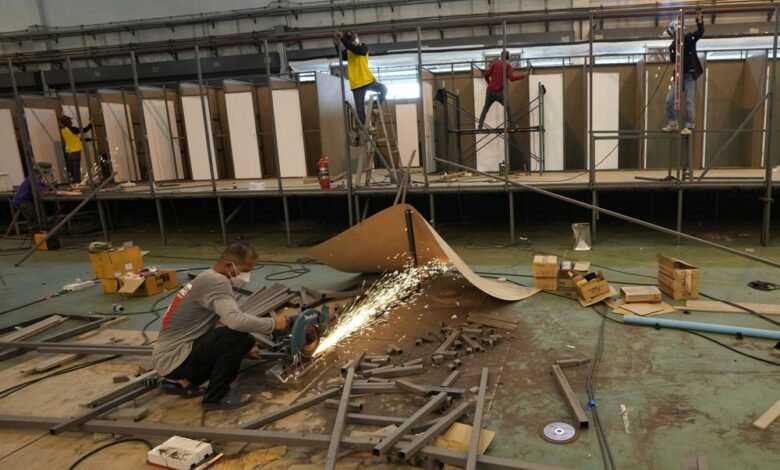
BANGKOK, Thailand (AP) — Health authorities in Thailand raced to set up a large field hospital in a cargo building at one of Bangkok’s airports on Thursday as the country reported record numbers of coronavirus cases and deaths.
Other field hospitals are already in use in the capital after it ran out of hospital facilities for thousands of infected residents.
Workers rushed to finish the 1,800-bed hospital at Don Mueang International Airport, where beds made from cardboard box materials were laid out with mattresses and pillows. It is to be ready for patients in two weeks.
The airport, a domestic and regional hub, has had little use because almost all domestic flights were canceled two weeks ago.
The quick spread of the delta variant also led neighboring Cambodia to seal its border with Thailand on Thursday and order a lockdown and movement restrictions in eight provinces.
Thailand reported 17,669 new cases and 165 deaths on Thursday, its highest number since the pandemic began in early 2020. Of those, 7,875 cases and 127 deaths were in metropolitan Bangkok, a region of nearly 15 million people.
Bangkok and its surrounding provinces have been in lockdown for more than two weeks, with overnight curfews and access only to supermarkets, pharmacies and essential services such as hospitals.
Authorities said about 6,100 patients in the Bangkok area are waiting for beds. Of those, 103 are in critical condition, 1,410 have moderate symptoms and 4,662 have mild symptoms. Nearly a quarter of a million people around the country are in medical facilities, some with symptoms and some without.
Thailand has recorded a total of 561,030 cases and 4,562 deaths. More than 90 percent have been reported during the surge that began in early April.
At a market near the airport, a few people were out shopping and many said they were concerned about the virus’s spread.
“I watched the news and I got so stressed and depressed about so many people needing help. I don’t leave the house very often anymore, only once in a while when it becomes necessary to buy some supplies,” said Chaninart Aimoat, a 32-year-old office worker.
Prime Minister Prayuth Chan-ocha’s government is facing harsh criticism over its handling of the virus surge and slow vaccination program, amid reports of people dying in the streets or in their homes while waiting for treatment.
Thailand hopes to provide 100 million doses of vaccines and inoculate 70 percent of its population within this year. So far it has administered 16.6 million doses nationwide. Around 18.5 percent of its 69 million people have received at least one dose while 5.5 percent are fully vaccinated.
On Wednesday, Swiss Humanitarian Aid dispatched 100 respirators and more than a million antigen tests to Bangkok to help fight the outbreak, while Britain is to send 415,000 doses of AstraZeneca vaccine within two weeks.
Meanwhile, 1.5 million doses of Pfizer vaccine donated by the Us government are to arrive Saturday morning.
“We will be sending no less than 1.5 million doses of COVID vaccine, in fact the goal is 2.5 (million). But the first shipment will be 1.5 (million),” said Thai-born US Sen. Tammy Duckworth.
Neighboring Cambodia is to receive its first batch of 1 million vaccines donated by the US on Friday, as it takes steps to slow a surge around the country thought to be caused by Cambodian workers fleeing Thailand.
Prime Minister Hun Sen said the border will be shut to everything except commercial traffic until Aug. 12.
Cambodia’s health ministry on Thursday reported 765 new cases and 11 deaths. It has confirmed a total of 75,152 cases and 1,339 deaths.
Unlike Thailand, more than 40 percent of its population has had at least one vaccine dose. Cambodia plans to vaccinate at least 12 million of its approximately 17 million people.
___
IMAGE: Workers prepare a field hospital set up inside a cargo building in Don Mueang International Airport in Bangkok, Thailand, Thursday, July 29, 2021.

